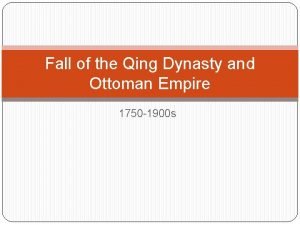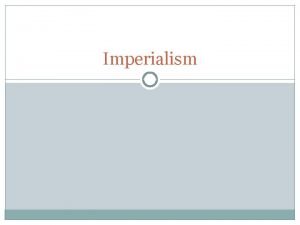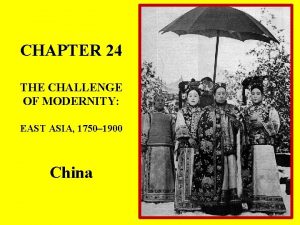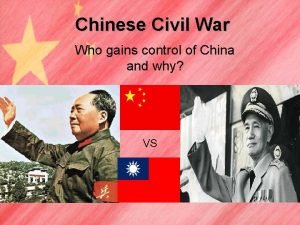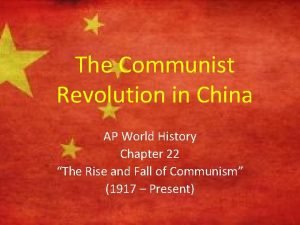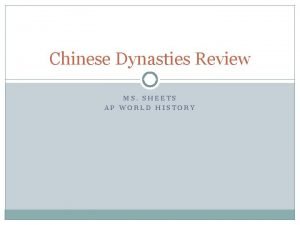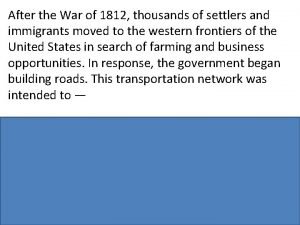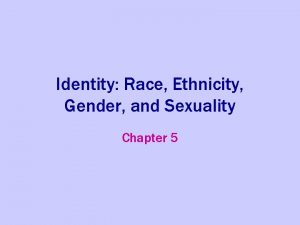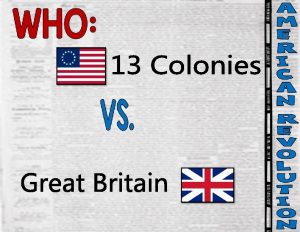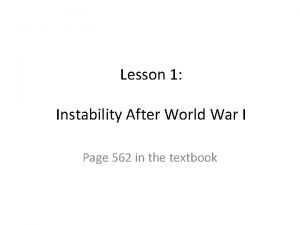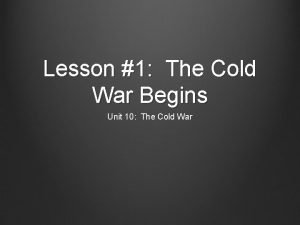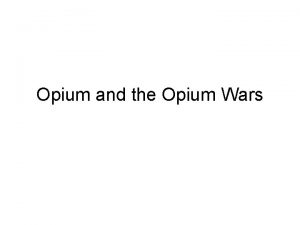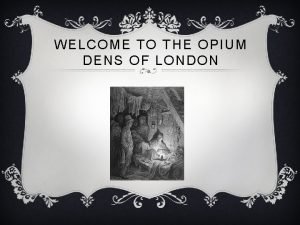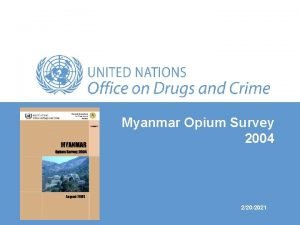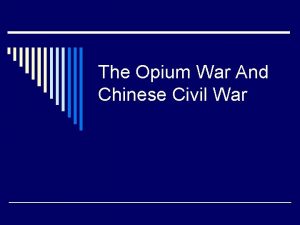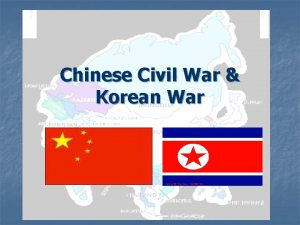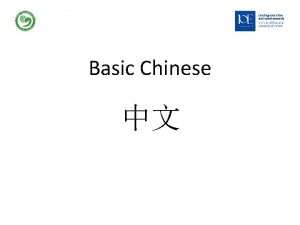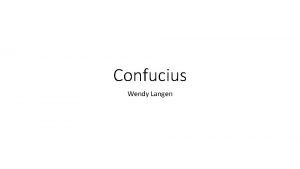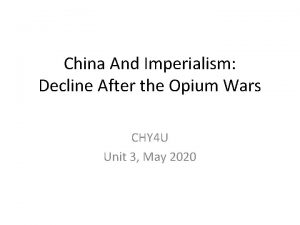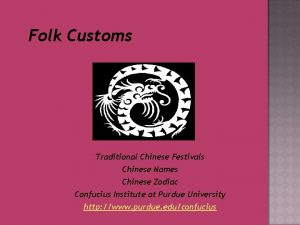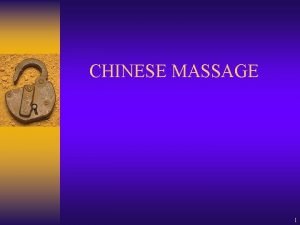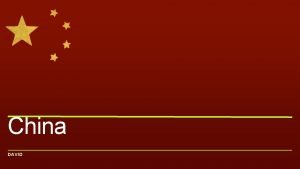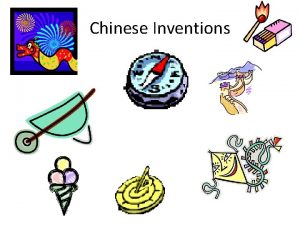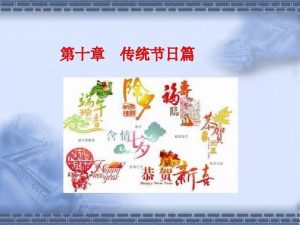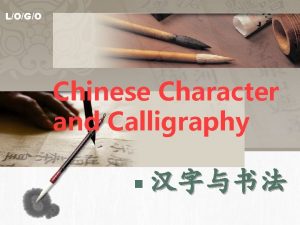Chinese History After the Opium War including the



































- Slides: 35

Chinese History After the Opium War including the death of Consort Zhen Western Imperialism of China http: //www. history. com/shows/mankind-thestory-of-all-of-us/videos/opium-in-china Mankind, the story of us all opium in china, this link should work: ) Opium Wars

Background • Qing (Manchu) Dynasty – Conservative • Empress Dowager (Ci Xi) – Resistant to change – Feared Western influence – Reestablished the Civil Service System • Fostered corruption • Different from past, needed to know about the Bible

The Importance of Tea • China has the monopoly of sale of tea until 19 th century • Tea is the drink of the working class in Britain • By 1760, tea was 40% of all imports to Britain • Created trade deficit with China • T F Without desire for tea, opium would not have been sent to China

Opium: The Back Story No need to take notes • Well known through ancient times, used as a treatment for cholera • Consumed by mixing it with food or drink • Tobacco smoking – New World • Ritual purposes • Spread with sailors • Tobacco smoking • Grown all over the world smoking of opium

Opium: Produced in India • India had been producing Opium in South E Asia • British East India Company declares monopoly on opium • Warehouses and production are standardized how to grow, weigh and costs… Just like other Industries

What were the causes and results of the Opium war? (1839 -42)

Opium War (1839 -42) • Factors leading to war – West saw $ in trade w/ China – 1700’s trade benefited China – 1800’s European trade increases • Britain realized it can sell opium from India to the Chinese (which was used for Chinese tea)

The Opium Trade 1820 - late 1830 s • Silver and Cotton were traded for Tea, Silk, Porcelain • Britain had trade deficit w China • Smuggled opium into China • 12 Million Addicted • Commissioner Lin fights back

“I am told that in your own country opium smoking is forbidden under severe penalties. This means that you are aware of how harmful it is. . . So long as you do not take it yourselves, but continue to make it and tempt the people of China to buy it, you will be showing yourselves careful of your own lives, but careless of the lives of other people, indifferent in your greed for gain to the harm you do to others; such conduct is repugnant to human feeling and at variance with the Way of Heaven. . . On receiving this, Your Majesty will be so good as to report to me immediately on the steps that have been taken at each of your ports. ” Commissioner Lin

Opium War (1839 -42) • Many Chinese become addicted to Opium – 1836 China bans use of opium – 1839 20, 000 chests of opium destroyed – Chinese ships clash w/ British (Opium War begins) – Britain wins the Opium Wars - and is able to sell Opium and other goods within China

Results of Opium Wars – The Treaty of Nanjing – 1842 (Nanking) Ends Opium War • forces China to pay war costs! • Britain obtains Hong Kong • est. 5 treaty ports (14 by 1900) to trade with West Britain is most favored nation Treaty signed at Port of • Britain won’t kow to Canton emperor • Extraterritoriality: British can live in China and follow their own laws!

Sign in a British Community

What domestic problems did China face in the 19 th century? The Taiping Rebellion 1850 -1864 • Led by Hong Xiuqan • “Taiping Heavenly Kingdom” • Appeal • Promised social reforms • Promised land women the right to vote • Peasants lost faith in government • As a result, the Chinese wanted to reestablish Chinese nationalism

Taiping Rebellion (Civil War: 1850 -64) • Most devastating peasant revolt in history! – goal — remove Qing Dynasty from power – 20 -30 mill dead • Rebels: – promoted end to bribery & immorality – gained control over large areas of China

Taiping Rebellion (1850 -73) • Ultimately fails • Gov sent warlords to stop it • The warlords were bribed, allowing for Spheres of Influence to be carved out more to come on that

Reconstruction & Self. Strengthening (no notes necessary) • Rebuilding period post-rebellion – destruction of irrigation – mulberry trees (silk) • This was the basis of the Chinese economy • Regional governors are established as a result of the rebellion – Used army & local commanders • est. soup kitchens • lower taxes Li Huang-chang • rebuild agriculture

Reconstruction & Self. Strengthening • Modernization process: – Industry • shipping • communication • refining • textiles – Military • training & equipment – compete w/Russia & Japan

Why didn’t the self-strengthening movement succeed in modernizing China? Result: Reform fails due to conservative resistance in govt. Neighbors industrialized much quicker (Japan) Empress Doweger Cixi

Open Door Policy (1899) • U. S. response to Nanking – European encroachment into China’s interior – fears that China would be closed to trade • The open door policy stated that all European nations, and the United States, could trade with China.

“Open Door” Policy 1899 -1900 • Allowed China to keep independence politically and culturally • Led by US • All Ports Open • Created Spheres of Influence

Spheres of Influence

Boxer Rebellion (1900) • Religious society – rebel against foreigners • fed up w/ missionaries • lack of respect for Chinese culture • destroying Chinese society • defeated by foreign troops – Result: • Chinese leaders realize must reform

The Boxer Rebellion 1898 -1900 No notes • Focus was Christian Missionaries • The “Righteous and Harmonious Fists” aka The Boxers • 2 German Missionaries Killed to increase in Christian Presence • Stormed the Capital and Attacked: • Christian Symbols- torched homes • Christian Missionaries- 182 Protestants, 48 Catholics • Christian Converts- 500 Protestants, 18, 000 Catholics

The Boxer Rebellion • Many Chinese resented the western influence in China which led to the Boxer Rebellion to, “drive out the foreign devils”. • The Boxers attacked foreigners across China. • As a result, the West and Japan organized a force to rescue foreigners in Beijing • They were defeated by the European powers, the U. S. and Japan.


The Boxer Protocol • China had to pay for the war (indemnity) • Western powers stationed in Beijing Collapse of “Old” China Rise of “New” China

Why did the people begin to turn on the Chinese government? • Sun Yat-sen • rise of Han Nationalism • Partner with General Yuan Shikai • Used Military takeover • NO reforms had occured • Ruled 1911 -1916 • 1916 -1928 Fragmentation, Warlords • Rise of Nationalists and Communists Dr. Sun Yat-sen

Sun Yat Sen’s Nationalist Movement • Main goals: – To make China a modern state. – Create national unity in China – Create a more democratic China – Get foreign powers out of China

Effects • China had to make concessions • China reforms • Nationalism, Democracy, and Livelihood take over as principles of the Chinese • In 1911 a 2, 000 year old monarch topples, and China has its first president (Sun Yixian)

Aim: How did the Chinese attempt to end foreign imperialism in their country? • Do Now: Write a paragraph in your notes explaining the story of the three cartoons below in regards to imperialism in China?

https: //www. youtube. com/watch? v =al. Jalt. Umr. Go Imperialism Crash Course https: //www. youtube. com/watch? v =a 1 effb 6 kb. CQ Crash Course Opium Wars same as the other, just about China, though

Activity: Read pages 805 -809 and answer the following questions Why did the Chinese come to hate those who had conquered them? How did the Boxers propose to solve China’s problems? Did they succeed? Why did the Manchus hate and fear Sun Yat-sen? What were Sun Yat-sen’s goals for China? Did Sun Yat-sen live to see his goals accomplished? Explain.

Summary Question.


 The rise and fall of qing dynasty
The rise and fall of qing dynasty After me after me after me
After me after me after me John 14 1
John 14 1 Opium wars defintion
Opium wars defintion Denoral equivalent
Denoral equivalent Opium wars and boxer rebellion
Opium wars and boxer rebellion Open door policy defintion
Open door policy defintion Why did britain begin exporting opium to china?
Why did britain begin exporting opium to china? Alkaloidi podela
Alkaloidi podela Opium adalah
Opium adalah Opium chapter 24
Opium chapter 24 Primary 3 malay worksheets
Primary 3 malay worksheets Civil war resumes
Civil war resumes Who won the chinese civil war
Who won the chinese civil war Chinese communist revolution ap world history
Chinese communist revolution ap world history Chinese communist party ap world history
Chinese communist party ap world history The face that is painted with green color in chinese opera
The face that is painted with green color in chinese opera History of chinese checkers
History of chinese checkers Ap world history chinese dynasties
Ap world history chinese dynasties Chinese concubines history
Chinese concubines history I see broad daylight on the other side
I see broad daylight on the other side Chapter 33 section 4 foreign policy after the cold war
Chapter 33 section 4 foreign policy after the cold war Chapter 28 lesson 1 instability after world war i
Chapter 28 lesson 1 instability after world war i After the war of 1812 thousands of settlers
After the war of 1812 thousands of settlers Migration after world war 2
Migration after world war 2 First day after the war poem
First day after the war poem British debt after the french and indian war
British debt after the french and indian war Europe after ww2 map
Europe after ww2 map Lesson 1 instability after world war i
Lesson 1 instability after world war i War at home and abroad madison
War at home and abroad madison Description
Description Lesson 1 the origins of the cold war
Lesson 1 the origins of the cold war Presidential and congressional reconstruction venn diagram
Presidential and congressional reconstruction venn diagram Why did josette dugas want to go to war
Why did josette dugas want to go to war Ich bin du bist remse
Ich bin du bist remse Balanced force
Balanced force
